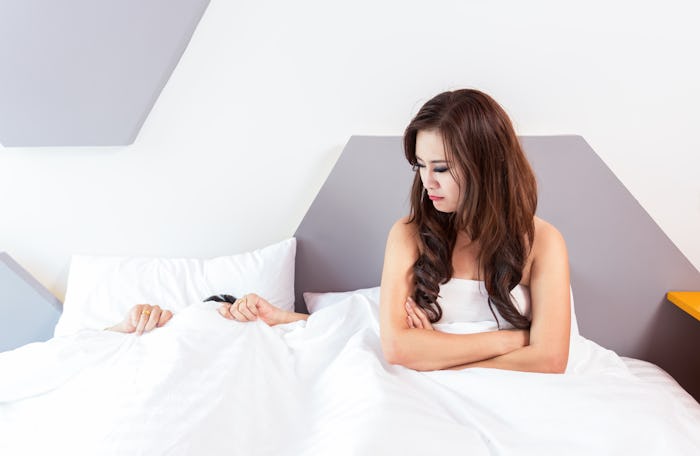When life gets stressful, we're often advised to "sleep on" big decisions we need to make, or told that there's not much that a good night's rest can't fix. While that might be useful advice for some of us, there are many people who struggle with a number of sleep-related problems. As it turns out, the vast majority of them are women. What is the gender sleep gap? Science shows that men get more (and better) sleep than women — but why?
Researchers at Georgia Southern University recently released the findings of a a sleep study they did that found that, when a couple has children, it's moms who end up the most sleep-deprived. 48 percent of women with children said that they get less than seven hours a sleep each night. Of course, women didn't need science to tell them that they're sleep-deprived, but what was interesting was that the men in the study who had children didn't report any less sleep than the men who did not. This led researchers to conclude that having kids impacts mom's sleep, but not dad's. Or, at the very least, having kids impacts mom's sleep to the extent that it's noticeable in their waking hours.
This isn't the first time that science has found evidence that men and women have very different relationships to sleep, however, and a lot of it comes down to biology more than anything else. One study found that circadian rhythms — the "clock" in our body that tells us to go to bed — differ between men and women. On average, a woman's internal "clock" runs about six minutes faster than a man's. Additional studies found that some women's internal clocks run even faster than that — completing a daily cycle in less than the usual 24 hours.
When you consider the other major cycle that many women endure — the hormonal one — it's not surprising that their circadian rhythms march to a different drum than men's. Throughout the month (not to mention throughout one's lifespan) hormonal changes have a systemic effect on the body that can certainly influence sleep. Pregnancy, too, can certainly make good sleep harder to come by, as can symptoms of menopause like hot flashes.
That being said, one study from Penn State College of Medicine found that women seem to be able to function on less sleep in ways that men can't. Women also tend to be able to "bounce back" from sleep loss after they have the chance to catch up. Of course, that may also be part of what some argue is an evolutionary development: women also tend to be lighter sleepers, making them more likely to hear and respond to things in their environment during the night (like a sick kid). At least if women evolved to wake up easier, evolution also gave them the ability to efficiently recharge.
Regenerative powers aside, women still suffer more sleep-related conditions than men, and it's not just insomnia. Even conditions that tend to be more common in men, like sleep apnea, still afflict women — but the symptoms might be different, meaning they're less likely to get an accurate diagnosis.
While there may not be a lot we can do to mitigate the biological factors that influence sleep, there are certainly steps that can be taken to make sure women don't get the brunt of nighttime responsibilities. One survey from 2011 showed that women get "the night shift of care taking," and 32 percent of women reported sleep interruptions, often attributed to childcare. Just 11 percent of men reported having their sleep interrupted, and often it was for things like checking to make sure the front door was locked, or getting up to use the bathroom. So, while science hasn't totally figured out a cure for premenstrual insomnia, men and women should be able to divvy up those interruptions a little better so moms aren't always the ones giving up those precious Zzz's.
